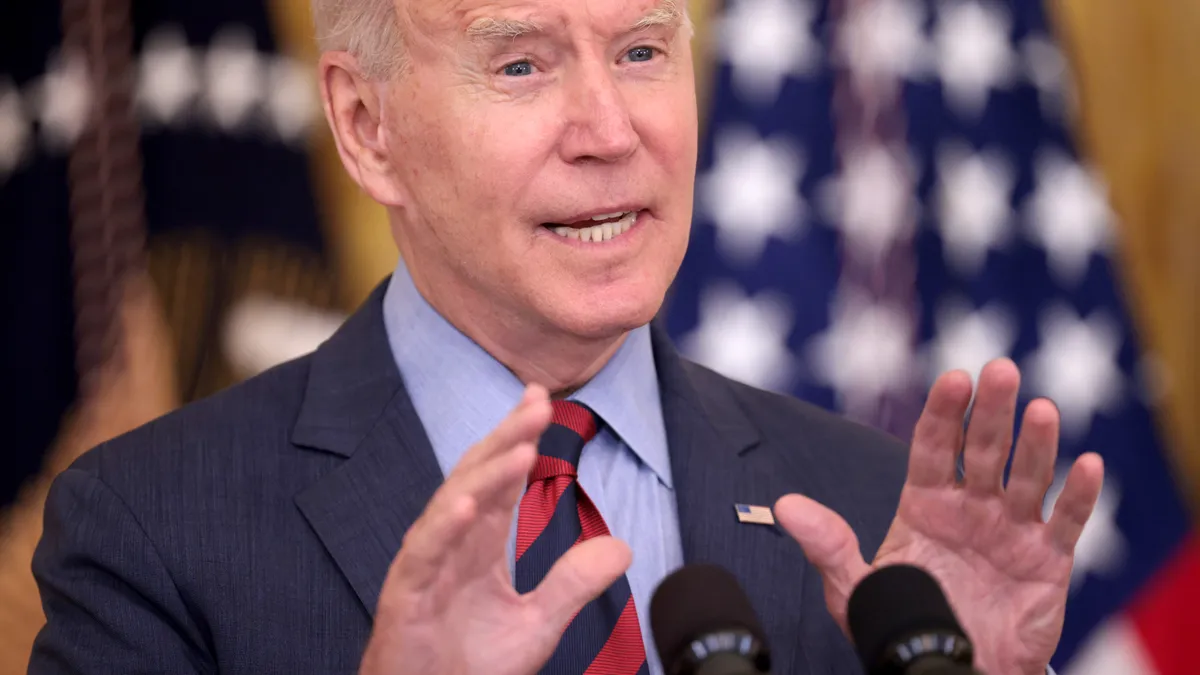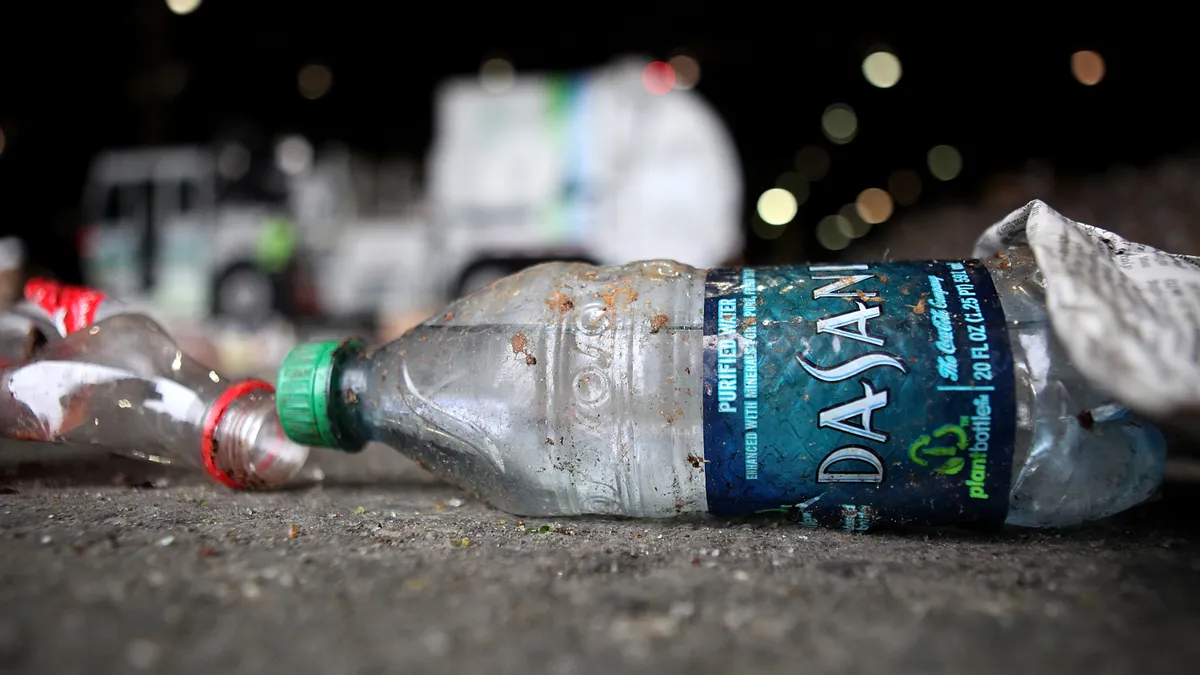"I really love my job, if you can't tell. It’s just been very fun," said Rumpke Director of Communications Amanda Pratt in a way that radiated pride through the telephone. Since 2000, Pratt has been feeling pride at Rumpke, a family-owned waste company based in Colerain Township, OH. Her position in communications has allowed her to grow from knowing little about the business of waste and recycling to being a voice behind some of the company's biggest business operations to date.
For the fifth installment of the "Women in Waste" spotlight series, Waste Dive caught up with Pratt to get her perspectives on having a strong female voice in an industry that thrives on communication.
WASTE DIVE: How did you get started working with Rumpke?
AMANDA PRATT: I came here not long after I left Ohio University. I had studied public relations and journalism there, and I worked at the Chamber of Commerce in my hometown and eventually took a job with COSI in Columbus, OH ... It was a position where I was just hired to do [media interviews] and I wanted to move to a larger city and I was looking for a challenge, a new challenge ... So I saw the Rumpke communications assistant position in my university newsletter that they sent out to alumni. I applied for the position, moved from my hometown to Cincinnati, and just got started here. At the time it was a very small department, there were only two other ladies, and we were basically known for a lot of our community outreach, specifically educational efforts.
Graduating with a journalism degree, did you ever anticipate ending up in the garbage industry?
PRATT: [Laughs] Not at all. Never in a million years. I could not have imagined it, but I feel blessed every day that this is where I work. It's just an exciting industry and it's an exciting time. I really enjoy the fact that it's one of those things that people don’t think about in great detail – you know, you throw something away and nobody's thinking about, "Where is away?" So what I really enjoy is being able to take the technical pieces of our operations and our business, and find ways to communicate those so the general public will be passionate and interested as well ... I think it's just really fun and encouraging and even inspiring to see the reaction when people learn about our operations in our industry. They're so surprised and it's uplifting to be a part of that.
What have you felt is your greatest accomplishment at Rumpke so far?
PRATT: Growing the communications team. We started with just a couple of people in our department and at the time, we were just there to simply do tours and get things ready for trade shows. Really being able to expand those efforts [and] having that opportunity to build and grow our department to a team of eight which we have today ... has meant a lot to me, and being able to grow in my position from a communications assistant to the company's communications director has been a very fulfilling experience. But I can't ever say for a moment that I got any of it accomplished without the team and the foundation that Rumpke has in place.
One of the things I've really enjoyed getting involved in is the overall landfill expansion process and work on expanding our facilities. Whether we did a $32 million renovation at our recycling facility in Cincinnati ... after our old facility burnt down — which is a lot of media relations associated with that — or getting to communicate through more challenging times that come about when you are going through a very public process to expand a site, they've all meant a lot to me.
On the flipside of that, being a woman in the industry, what's the biggest hurdle you've had to face in your professional career?
PRATT: I do think that the industry is changing right now and I think it's a time when young people and women are able to take a very active leadership role in the things that are occurring. When I first arrived in 2000, it was really important to learn and to listen to the people that were the experts that had already been in our industry at our company for many years; I learned so much from them. But at the same time what I had really valued is I feel like those people have taught me about this industry, they've allowed me to sharpen my skills, they've allowed me to grow ... When a woman is selected in any industry, she's in that position because people trust her. They trust her expertise. So there's this sense of collaboration and knowing that you're the expert, you've been placed there and they're depending on you to offer direction or to offer your expertise to help with whatever the project may be. And I think that [the challenge has been] realizing and being aware of the process and taking the time to be patient but also knowing that it's important to be confident enough to share your expertise when you need to because the team is depending on you to do so.
Out of the 16 executives and directors at Rumpke, you are one of two women. Do you feel like you are on an equal playing field?
PRATT: Actually I do. I have never felt left out of anything. I have always been encouraged to grow and expand, I've always been involved in team projects ... This is a unique company in the sense that it's family-owned and it's just a very respectful environment, an environment where new ideas and innovation are encouraged, creativity is encouraged and our leaders are very open minded. So even though I arrived with a journalism and public relations background, if I had an idea about communicating a fee or communicating with facility neighbors about our landfill expansion, then it was taken seriously. Like any leader in the company, it was also expected that I would do my research, present the tools I was going to use for the evaluation of the project's success, present a budget, present a strategic plan … There's a very high expectation for the leaders at Rumpke. But everyone is treated fairly, no matter their gender.
You said you found your job through your university's newsletter. Is Rumpke still using connections with campuses and universities to draw in new recruits?
PRATT: Absolutely. My department in particular has a lot of women involved in leadership positions, and many of my team members were interns ... We definitely reach out and work closely with universities including University of Cincinnati. We've had [the university] do some economic studies for us so we have students get involved in that, we’ve had them do some studies of our landfill … We also have done a couple of projects with the University of Dayton, they studied our recycling facility in Dayton last year and did a class project about it and then we asked the students to get involved once again on a secondary project for this school year. We're definitely trying to reach out to the millennials and also develop those career-paving options so that they, too, can learn about our industry and see why people like myself, and you, find it so exciting and full of variety and room to grow.
How are you working to destigmatize the industry to increase recruiting?
PRATT: That is a great challenge. Definitely facility tours, and being active on social media is very, very key. But also going out to these universities, working with students directly, bringing them onto our campuses, letting them be involved in the work that we do, and then making a brand or ensuring that our brand reflects a professional, innovative, technologically advanced operation. I can agree that that stigma is out there and it is a challenge for our industry, especially in recruitment. But we do have to work to ensure that our branding is very consistent and our messaging is consistent and that we don't just pick up your trash every week. There is a lot involved in what we do, it's a very complex business organization. Even on our tours, even with the smallest kids, we're taking the time to talk with them about jobs. We don't just say "Oh we have 1,200 drivers." We’ll go into, "We have all these accountants, we have 30 IT people, we have safety people, and customer service, and sales and marketing and advertising and engineering," just so they get to see the breadth of what is involved in our industry and in our company.
What do you hope the industry looks like in 10 years, especially for women?
PRATT: I would like to see more women get involved in our industry ... I would like to bring more interns to our campus that are female and let them work in our different departments, and I think it will be important for us to do community outreach that just teaches people about the careers that are involved with our organization. I think that's the biggest step — just making people aware, just like how people aren't aware of how a landfill is constructed, they're not aware of the different jobs or opportunities that even exist with a waste company or a recycling company, so it's really on us to go out and share the benefits of working in this industry. And I think that's happening on a national level ... We're taking steps to involve our next generation in our industry and we're really trying to tailor some of our marketing and communications to youths. Just so they have an early awareness of our brand — an innovative, technologically advanced, polished process in an industry that you want to be part of because it makes a difference in the world that you live in.











